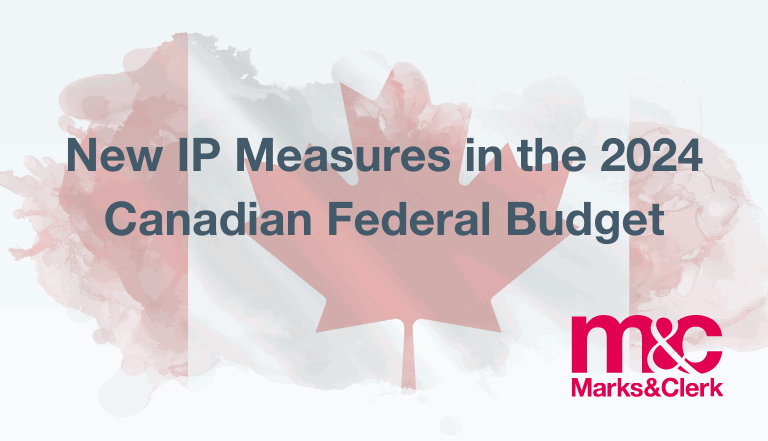On April 16, 2024, Canada’s Department of Finance tabled the 2024 Canadian Federal Budget (“Budget 2024”). Budget 2024 contains proposals about intellectual property ("IP") that will be beneficial to innovative Canadian companies, both big and small, that intend to pursue Canadian patent rights within the next several years.
Patent Expenses – Businesses that invest in developing cutting-edge technology are recognized as a key driver of Canada’s economic growth. In an effort to incentivize more innovation and productivity, Budget 2024 proposes to allow businesses to immediately write off the full cost of investments in patents. To benefit from this measure, eligible investments, as specified in the relevant capital cost allowance classes, must be made on or after Budget Day (namely, April 16, 2024) and before January 1, 2027. The cost of this measure is estimated at $725 million over five years, beginning in the 2024-2025 fiscal year.
Enhanced SR&ED Support for Small and Medium Sized Businesses – The Federal Government is in the process of revising the current suite of tax incentives under the Scientific Research and Experimental Development ("SR&ED") program. Initial consultations were conducted between January and April 2024 to explore cost-neutral ways to enhance the program to support innovative businesses. Budget 2024 announced that a second phase of consultations will be launched to hear further views from businesses and industry on specific technical reforms, including an exploration of how Canadian public companies can become eligible for the enhanced credit. In particular, Budget 2024 proposes to provide $600 million over four years for future enhancements to the SR&ED program.
“Patent Box” Consultations – Although Budget 2024 does not allocate any specific funding, Budget 2024 notes that the Federal Government carried out consultations to explore the creation of a “patent box” regime in January 2024. Generally, a “patent box” regime refers to a taxation structure in which business income earned from IP is taxed at a rate below the statutory corporate income tax rate. The intention of the regime is to encourage the development and retention of IP in Canada. While tax incentives for early-stage research and development ("R&D") are currently available in Canada, the “patent box” regime is expected to provide support to transition the knowledge gained through this R&D into commercialized patents. Submissions received through the consultation are presently being considered and may very well be applied to patent box measures in future budgets.
Additional Funding for Innovation Asset Collective – Budget 2024 proposes to provide $14.5 million over two years to Innovation, Science and Economic Development Canada for the Innovation Asset Collective, a not-for-profit organization that runs a patent collective pilot program focusing on Canada’s clean tech sector. Launched in 2020, the patent collective pilot program helps innovative Canadian small- and medium- sized clean tech businesses by providing funding for IP costs, providing IP education and IP market intelligence, and providing access to the patent collective which provides a buffer against assertion of patent rights by foreign entities. The goal of the Innovation Asset Collective is to encourage these innovative Canadian businesses to maintain operations in Canada and retain ownership of their IP, which ultimately secures the future of their workforce in Canada and helps the clean tech sector in Canada to thrive.
Budget 2024 also contains proposals in support of consumers’ rights that will affect the technological protection measures offered by the Copyright Act
Interoperability – When equipment or devices from different brands do not work together, this can lead consumers to purchase additional equipment. If brands are required to ensure interoperability of their equipment with other equipment, including the equipment of other brands, this can lead to costs savings for Canadians. Budget 2024 addresses interoperability in the context of farming, where non-interoperable equipment forces farmers to buy new equipment, driving up food prices. The Federal Government aims to address the issue of interoperability by amending the Copyright Act. Budget 2024 announced that the Federal Government will launch consultations on this issue of interoperability. In the meantime, the Federal Government called on the provincial and territorial governments to amend their contract laws to support interoperability. The Federal Government will announce further details of these consultations shortly.
Revamping the Right to Repair Devices – Due to their disposable lifecycles, many electronics and appliance products are replaced rather than repaired. This has unfavourable consequences for the environment and is costly for Canadians. To ensure longevity of devices, the Federal Government is advancing a right to repair. This will have the effect of increasing product lifespan. The Federal Government is currently in the process of passing two bills to amend the Copyright Act (Bill C-244) and the Competition Act (Bill C-59) to support the right to repair. The Copyright Act amendment will allow the circumvention of technological protection measures (digital locks) for the purposes of repair, and the Competition Act amendment will prevent manufacturers from anti-competitively refusing to provide the parts, tools, or software necessary for repairs. Budget 2024 announces that the Federal Government will launch consultations in June to develop a right to repair framework with a focus on durability, reparability, and interoperability. The Federal Government also calls on the provincial and territorial governments to amend their contract laws to support the right to repair and interoperability. The Federal Government will announce further details of its right to repair framework in the coming months. It is exploring how to address planned obsolescence, the merits of a durability index, and whether further legislative changes are needed.
Budget 2024 is scheduled to be voted upon for enactment by Royal Assent in the next several months.



